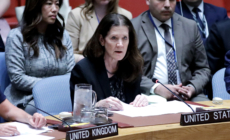-
Yankees Would Land Rival Star in 3-Player Trade Idea After Jazz Chisholm Jr. Return - 7 mins ago
-
Map Shows Countries Impacted by Trump’s New Travel Ban - 42 mins ago
-
Who Does Trump’s New Travel Ban Include and Exclude? - 43 mins ago
-
15-year-old, pinned by car, is killed at SoCal high school - 60 mins ago
-
‘Wicked: For Good’ Just Dropped Its Official Trailer: Everything We Know About Part Two - about 1 hour ago
-
5 Takeaways From the First N.Y.C. Mayoral Debate - about 1 hour ago
-
Hamas Says US Ceasefire Veto Violates ‘American Values’ - 2 hours ago
-
‘Carol,’ Whose Detention Rattled Her Small Missouri Town, Is Released - 2 hours ago
-
Pali High’s stadium burned. Their Hollywood Bowl graduation is bittersweet - 2 hours ago
-
Jets QB Justin Fields Doesn’t Hold Back About His NFL Future - 2 hours ago
Who Are the Three Republican Senators Who Voted Against Pete Hegseth?
Late Friday night, all but three Republican senators voted to confirm President Trump’s pick for defense secretary, Pete Hegseth, creating a 50-to-50 deadlock that required Vice President JD Vance to come break the tie.
But close followers of the Senate likely weren’t surprised to see who had defected.
The two most senior Republican women in the chamber, Senators Lisa Murkowski of Alaska and Susan Collins of Maine, are generally viewed as moderates and have long been considered pivotal swing votes. Both voted against their party’s attempt to repeal the Affordable Care Act in 2017, and they sided with Democrats in favor of confirming Justice Ketanji Brown Jackson to the Supreme Court.
And Senator Mitch McConnell, the former Republican leader, has in recent years become a more vocal critic of Mr. Trump and in return garnered personal attacks from the president and his supporters.
After initially refusing to denounce Mr. Trump’s false claims of election fraud, Mr. McConnell later condemned his repeated attempts to overturn the 2020 election and called the president “practically and morally responsible” for the Jan. 6, 2021, attack on the Capitol by his followers. Even though Mr. McConnell endorsed Mr. Trump’s campaign last year, the two men had not spoken to each other for almost four years, and the agreement was hammered out by their aides.
Notably, none of them directly cited the allegations of personal misconduct against Mr. Hegseth — which include sexual assault, physical and verbal “abuse,” excessive drinking and financial mismanagement, all of which Mr. Hegseth denied — as reasons for opposing his confirmation.
Instead, they focused their criticisms primarily on Mr. Hegseth’s lack of managerial experience and, for Ms. Murkowski and Ms. Collins, his disparaging comments about women serving in combat roles. Ms. Murkowski also said earlier last week that the misconduct allegations against him “do nothing to quiet my concerns,” and said his past infidelity on multiple occasions had demonstrated a “lack of judgment that is unbecoming of someone who would lead our armed forces.”
Mr. McConnell, who has been one of the Senate’s most vocal advocates of aiding allies abroad, stressed that in his view, Mr. Hegseth had not demonstrated a sufficient understanding of national security challenges to handle the job of defense secretary, which he called “the most consequential cabinet official in any administration.” He also took a shot at the claim that Mr. Hegseth, a combat veteran, would restore a “warrior culture” in the U.S. military.
“The restoration of ‘warrior culture’ will not come from trading one set of culture warriors for another,” Mr. McConnell said in a lengthy statement after the vote.
Mr. McConnell’s opposition to Mr. Hegseth could foreshadow additional “no” votes against other key national intelligence nominees, including Tulsi Gabbard, Mr. Trump’s pick for national security adviser, and Kash Patel, his choice to lead the F.B.I.




















